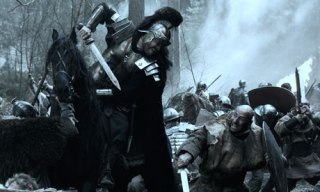Starring Michael Fassbender and Olga Kurylenko follows a band of grizzled, war-weary Roman soldiers stationed in Britain during the year 117 AD. After an ill-fated marsh across the border into Caledonia (modern-day Scotland), they become separated from the legendary ‘Ninth Legion’ and find themselves stranded deep behind enemy lines. Directed by British director Neil Marshall, (The Descent [2005]) Centurion quickly establishes itself as refreshingly superior to the standard, run-of-the-mill ‘swords and sandals epic’.
Centurion’s neutral palette of greys, browns and blues successfully complement the film’s sombre, depressive tone. Marshall has carved a career out of his artful depiction of ‘blood-letting’, and his latest effort certainly doesn’t shy away from realism in it’s depiction of extreme violence and visceral death, daily realities of life as a Roman soldier. The art direction and cinematography featured in Centurion are particularly impressive, and at times reminiscent of Peter Jackson’s Lord of the Rings trilogy’s sweeping shots of desolate vistas. Similarly Quintus Dias’ (Fassbender) narration is hauntingly familiar, and despite being in English, successfully captures the spirit of Latin prose.
Marshall creates a delicate balance of sympathies in his audience, who may well find themselves torn between the seemingly brutal and ruthless Picts and the efficient, homesick Romans. The Picts are depicted (through the subjective eyes of their Roman victims) as monsters and barbarians. Yet it’s hard to absolve the Romans, as invaders, of the obvious brutality and ‘war-crimes’ committed during their stay in Britain. In addition to those fighting on both sides there is the ever-present spectre of Rome, the political machine driving the invasion, to which its own men are distant pawns. Although Marshall has dismissed modern-day parallels with Centurion’s ‘invader vs. native’ dynamic, it’s difficult not to view the film as some form of allegory for the UK’s recent foreign policy.
Michael Fassbender gives a wonderful performance as centurion Quintus Dias, thrust by fate into the unenviable task of leading his fellow soldiers back to safety. However, it is arguably Olga Kurylenko’s grim intensity as Pict tracker Etain that steals the limelight. Both beautiful and terrifying, Etain represents everything ‘foreign’ and frightening about the Picts, without succumbing to caricature or becoming unnecessarily sexualised.
Though unlikely to trouble the majority of this year’s other ‘sword and sandals’ entries (including big-hitters Clash of the Titans [2010], Prince of Persia: The Sands of Time [2010] and Robin Hood [2010]), Neil Marshall’s Centurion represents an admirable British take on an already over-crowded genre, and marks a return to form for the director after the disappointing Doomsday (2009).
Bernice Watson



